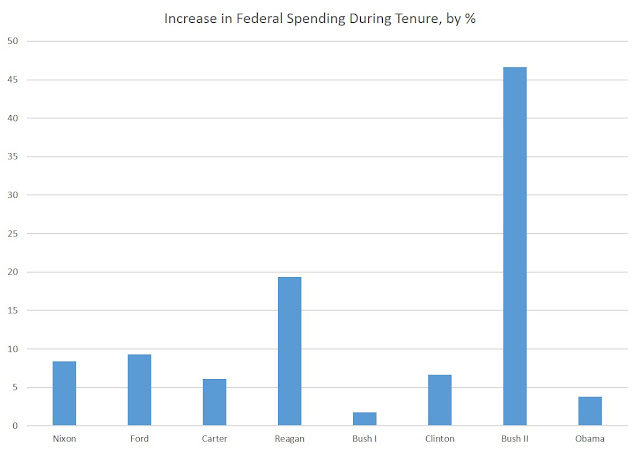If You Want Bigger Government, Vote Republican
Post# of 65629
Quote:
If You Want Bigger Government, Vote Republican
02/09/2016•Ryan McMaken
One of the nice things about Bernie Sanders is that he seems to be honestly saying flat-out that he plans to massively increase the size of government.
The other candidates are probably lying either to themselves or to us — or to both — about what they likely will do in office.
Of course, it's been so long since any president oversaw a federal government that actually cut spending, we'd have to go back to the immediate post-war years to remember any of that.
But, for decades, we've been told that a vote for the GOP is a vote for "smaller government." This is repeated both by Republicans, who say it like it's a good thing, and by Democrats who still seem to think that the GOP is committed to cutting grandma's safety net.
If we look at federal spending, though, it's easy to see that the myth of the budget-cutting Republican president is just that: a myth.
First, let's look at federal outlays overall. To make our analysis more simple, I have adjusted this for inflation, using the CPI, for lack of anything better. All dollar amounts here are in millions of 2015
dollars:

Just from eyeballing the graph, we can see a few things. Spending during the 1980s and 2000s was more robust than it was during the 1990s. And, we can see that after an initial huge jump in 2009, federal spending has been somewhat flat — albeit at a huge level of spending.
We also find that — given the timing of fiscal years and the politics of the budget process — the huge increase in 2009 was initially engineered not by the Obama administration, but by the Bush administration.
If we break out spending by each presidential administration, we can see how much spending increased during each one's tenure:

Because of the way that federal fiscal years work, we begin counting spending for a president in the fiscal year that begins after he's sworn in. For example, the periods we count for George H. W. Bush, are the fiscal years of 1990, 1991, 1992, and 1993.
This is because fiscal years end on September 30 meaning that when Bush was elected in 1988, the 1988 fiscal year had already ended more than a month earlier. And, the 1989 fiscal year would end just eight months after Bush was sworn in, having already been debated and planned under Reagan during late 1988.
Thus, it only makes sense to "blame" the 1989 fiscal year budget on Reagan, and the 1990 year on Bush.
Reagan and G.W. Bush Are the Worst Offenders
So, using this analysis, we do find that Bush I was the least-bad offender with federal spending increasing only 2 percent from 1990 through 1993. That's one in favor of the GOP claims for being against big government.
On the other hand, the top three worst offenders here are Republicans. As hard as it is to believe, there are still some people who think that Reagan cut the size of government, although Reagan was a big spender and laid the groundwork for the immense national debt we live with today.
During Reagan's tenure, counting FY 1982 to FY 1989, federal spending increased 19 percent. And worst of all, George W. Bush oversaw an increase in federal spending of 46 percent during his tenure.
We can compare this to an increase of 7 percent under Clinton and 4 percent under Obama, although, we'll likely have to assign the blame for 2016 and 2017 budgets to Obama.
However, even with all the coming increases in federal health care spending that we'll be able to thank Obama for, it's unlikely he'll be able to match the spending levels signed into law by Bush II.
I know that some people will complain and say that the 2009 spending increases — which included the massive bailouts in the wake of the 2008 crisis — should be blamed on Obama.
But, that would require us to forget that Bush II was a supporter of TARP, the auto bailouts, and immense amounts of fiscal "stimulus" in general that came in 2009.
Even the most rudimentary Google search shows that Bush was very much in favor of the massive spending increases that came in 2009.
Obama (and also surely McCain, had he won) would have done the same, but that doesn't change the fact that when given an opportunity to spend, the GOP grabs on to the opportunity with all its might.
Moreover, even if we changed our analysis to blame FY 2009 on Obama, and included FYs 2009-2015 in such a way as to assign 2009 to Obama's tenure, we'd still only find an increase of 17.7 percent in federal spending during Obama's time, so far. This compares to an increase of 32 percent for Bush, which would then include FYs 2001-2008.
We can fiddle with the measurements further, and including both election year and outgoing year for both. This means we'd be counting the increase from FY 2008 to FY 2009 and assigning that increase to Obama.
Of course, we also then carry the same method to all other administrations. We find, though, that no single year upends our analysis, although by this other count, we do find the two parties are a bit more equal:
https://mises.org/blog/if-you-want-bigger-gov...republican
 (1)
(1) (0)
(0)